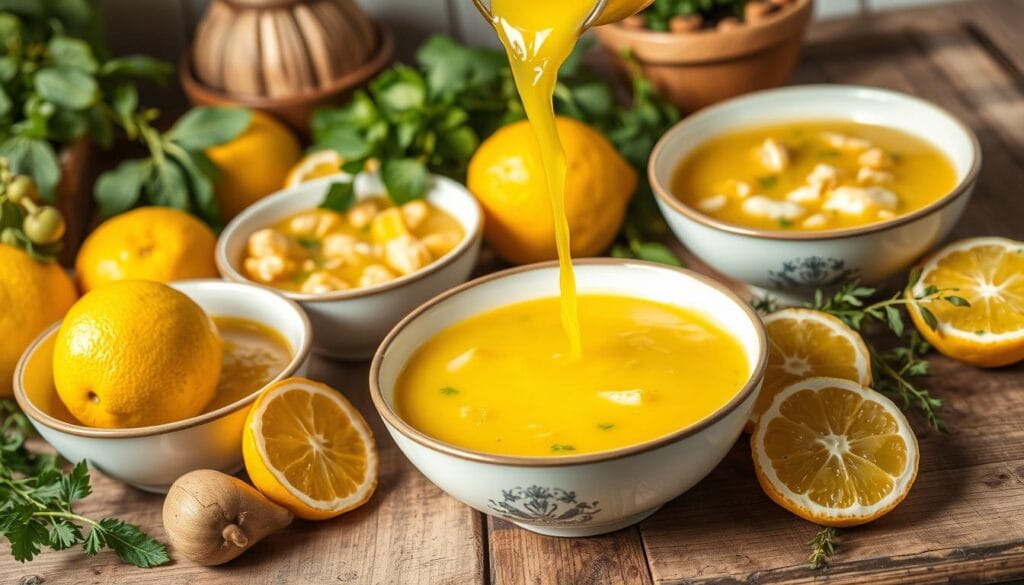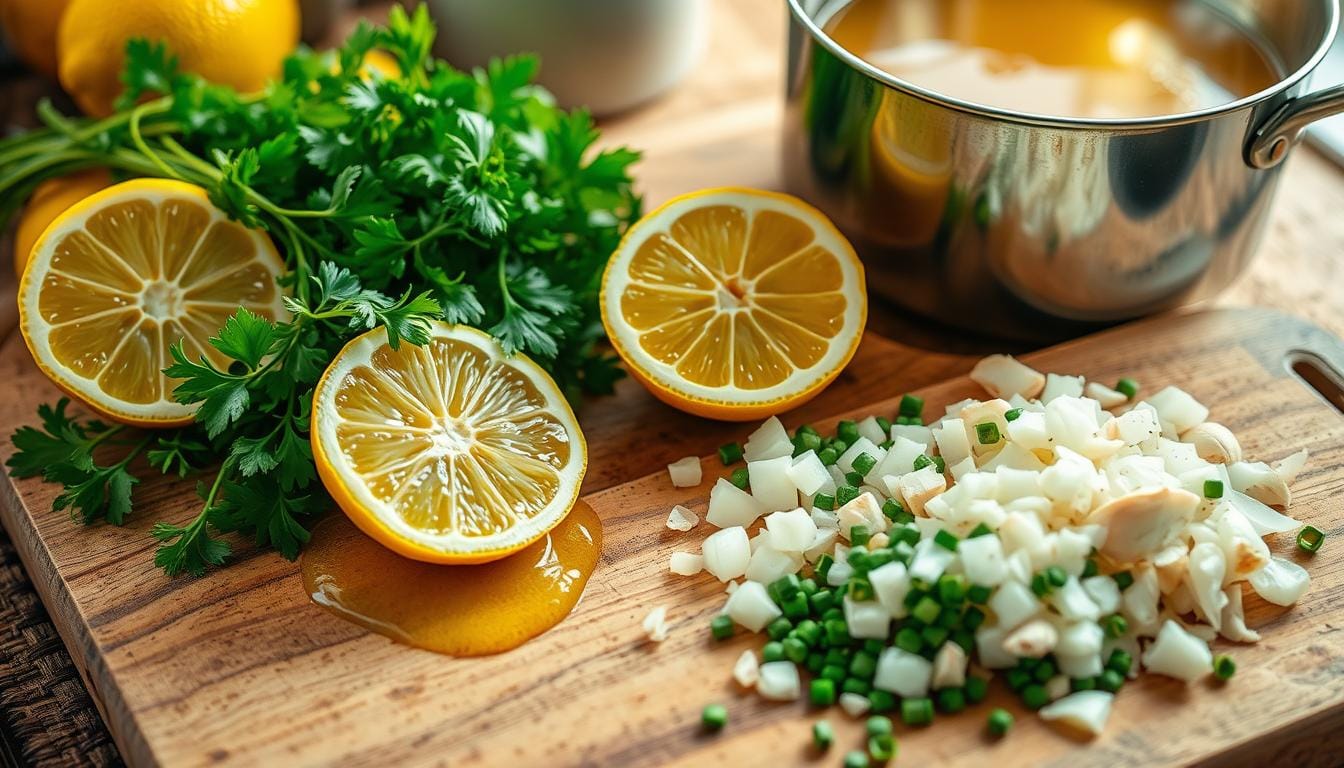Every time I lift the pot lid and breathe in the warm, bright aroma of my grandmother’s chicken soup, I’m transported back to childhood kitchens. It’s where magic happened with just a few simple ingredients. The secret weapon? A splash of lemon juice that turns an ordinary chicken soup recipe into something extraordinary.
Lemon juice in chicken soup isn’t just a flavor enhancement—it’s a culinary revelation. This humble citrus ingredient awakens taste buds, creating a vibrant depth. It turns a basic comfort food into a remarkable dining experience. From professional chefs to home cooks, understanding the power of acid in cooking can elevate your soup from good to unforgettable.
The magic of lemon juice lies in its ability to balance and brighten savory elements. When you add this zesty ingredient at the right moment, it creates a symphony of flavors. These flavors dance across your palate, making each spoonful more satisfying and complex.
Key Takeaways
- Lemon juice adds brightness and complexity to chicken soup
- Acid is a crucial element in developing depth of flavor
- Timing of lemon juice addition impacts overall taste profile
- Citrus can transform a simple soup into a gourmet experience
- Proper use of lemon enhances nutritional and taste characteristics
The Science Behind Adding Acid to Soups
Cooking is all about balancing flavors, and acid is key. Adding acidic ingredients to your soup does more than just add taste. It starts a chemical reaction that changes the dish.

Acid in cooking wakes up your taste buds and adds depth to simple recipes. It’s about how pH balance affects flavor and how ingredients work together.
Understanding Flavor Profiles and Taste Activation
Acidic elements make a big difference. They:
- Brighten bland flavors
- Cut through fatty or rich ingredients
- Create complex taste sensations
- Balance overall dish composition
How Acid Enhances Other Ingredients
Lemon juice, for example, boosts flavors. It works with proteins and other molecules. This releases hidden tastes that change how you experience your soup.
| Ingredient | Acid Interaction | Flavor Impact |
|---|---|---|
| Chicken | Protein breakdown | Enhanced savory notes |
| Vegetables | Cellular structure softening | Increased taste complexity |
| Herbs | Essential oil release | Intensified aromatic profile |
The Role of pH Balance in Cooking
pH balance is more than just chemistry. It’s a cooking technique that affects texture, taste, and quality. Acidic ingredients help create balanced flavors that please the palate.
“Acid is the secret weapon of great cooking – it transforms good dishes into extraordinary experiences.” – Professional Chef
Why Do You Put Lemon Juice in Chicken Soup?

Lemon juice turns a simple chicken soup into a vibrant dish. It adds a magical touch that makes the flavors pop. Adding lemon juice to chicken soup opens up a world of taste that goes beyond just seasoning.
“A splash of lemon can turn an average soup into a remarkable meal.” – Culinary Expert
Just a few drops of fresh lemon juice can change the flavor of chicken soup. Here are the main reasons why lemon juice is a game-changer:
- Balances rich and heavy flavors
- Adds brightness and freshness
- Enhances natural chicken taste
- Introduces nutritional benefits
Lemon juice does more than just taste good. It tenderizes chicken and adds a complex flavor. It also boosts vitamin C and antioxidants, making your soup healthier and tastier.
| Aspect | Effect |
|---|---|
| Flavor | Adds zesty brightness |
| Nutrition | Increases vitamin C content |
| Protein | Helps tenderize chicken |
| Cooking Technique | Best added just before serving |
Pro tip: Always add lemon juice to individual servings. This prevents bitterness and lets everyone adjust the tanginess to their liking.
The Perfect Timing: When to Add Lemon to Your Soup
Adding lemon to your soup at the right time can make a big difference. It turns a simple chicken soup into a lively dish. The timing is key to keep the lemon’s flavor bright and your soup zesty.
Knowing when to add lemon juice is crucial for a great taste. Chefs and home cooks agree that adding it at the right moment is essential. This ensures the lemon’s flavor is at its best.
Early vs. Late Addition Effects
- Early addition (during cooking): Flavor becomes muted and loses brightness
- Late addition (near end of cooking): Preserves vibrant citrus notes
- Ideal timing: After removing soup from heat, just before serving
Preserving Lemon’s Bright Flavors
Adding lemon to soup needs careful thought. Heat can quickly reduce the citrus’s delicate flavor. Chefs suggest a few strategies to keep it bright:
- Remove soup from direct heat source
- Allow soup to cool slightly (1-2 minutes)
- Stir in fresh lemon juice just before serving
Temperature Considerations
“The secret to perfect lemon flavor is all in the timing and temperature.” – Professional Chef
Temperature is important for lemon flavor. High heat can damage the citrus compounds, making the taste dull. Adding lemon juice when the soup is warm but not boiling keeps it fresh and vibrant.
| Temperature Range | Lemon Flavor Impact |
|---|---|
| Boiling (212°F) | Flavor loss, bitter notes |
| Warm (140-160°F) | Optimal flavor preservation |
| Cool (below 100°F) | Minimal flavor development |
By following these tips for adding lemon juice, your chicken soup will be full of bright, fresh citrus flavor. It will surely impress your taste buds.
Health Benefits of Adding Lemon to Chicken Soup
Adding lemon to chicken soup does more than just add flavor. It’s a health boost. Lemon is full of vitamin C, which is great for your immune system. This makes your chicken soup a nutritional powerhouse that helps fight off illness.
Lemons do more than just taste good in chicken soup. They are full of antioxidants that fight free radicals and boost wellness. These small citrus fruits add many nutritional benefits to your soup.
- Boosts immune system with high vitamin C content
- Provides powerful antioxidants
- Aids digestion and nutrient absorption
- Helps reduce inflammation
“A squeeze of lemon can transform your chicken soup from ordinary to extraordinary, both in flavor and nutrition.” – Culinary Health Expert
Vitamin C in soup is key for your body’s defense. Just one tablespoon of lemon juice gives you about 30% of your daily vitamin C. So, chicken soup with lemon is great for staying healthy during cold and flu seasons.
| Nutritional Benefit | Lemon’s Contribution |
|---|---|
| Vitamin C | 30% daily requirement per tablespoon |
| Antioxidants | Fights free radicals |
| Digestive Support | Improves nutrient absorption |
Remember, add lemon towards the end of cooking to keep its nutrients. By adding this simple ingredient, you’re making a delicious and healing meal. It supports your body’s natural defense systems.
The Classic Pairing: Why Lemon and Chicken Work Together
Culinary traditions worldwide have always celebrated lemon and chicken. This combo turns simple dishes into amazing meals. The bright, zesty lemon flavor pairs perfectly with the rich taste of chicken.
The lemon chicken pairing is more than just taste. It’s a dance of flavors that chefs and home cooks love. It shows how citrus and poultry can make simple ingredients shine.
Cultural Significance of Citrus and Poultry
Different cultures have their own ways of enjoying this flavor mix:
- Mediterranean cuisine loves lemon-roasted chicken
- Greek dishes often use lemon in chicken recipes
- Middle Eastern cooking marinates chicken with citrus
Flavor Chemistry Explained
“Lemon doesn’t just add flavor; it transforms the entire dish.” – Professional Chef
The science behind lemon and chicken is interesting. Lemon’s acidity tenderizes chicken and adds a bright taste. It balances the richness of chicken, making meals vibrant and refreshing.
Whether making chicken piccata, lemon pepper wings, or chicken soup, knowing how citrus and poultry work together can take your cooking to the next level.
Lemon Juice vs. Lemon Zest in Soup Making
Exploring citrus in soup can be a game-changer. Knowing the difference between lemon juice and zest can elevate your cooking. Each brings its own unique flavor to your chicken soup.
Lemon juice adds a bright, tangy taste that cuts through thick flavors. It gives an instant citrus flavor that lightens the soup. Just over 1/3 cup of lemon juice can make a big difference in flavor.
- Lemon Juice Benefits:
- Adds immediate tartness
- Balances rich soup flavors
- Provides quick acidic component
- Lemon Zest Benefits:
- Delivers intense aromatic qualities
- Introduces concentrated lemon essence
- Adds depth without extra liquid
Lemon zest comes from the outer peel and has essential oils for a deeper lemon flavor. Juice gives a quick burst of brightness, while zest adds a complex, layered taste. Chefs say using both is key for depth.
“The secret to exceptional soup is understanding how each ingredient contributes its unique character.” – Chef Maria Rodriguez
Pro tip: Always wash lemons well before using zest. Grate only the colorful outer layer, avoiding the bitter white pith. This will give your soup a sophisticated citrus taste.
Greek Lemon Chicken Soup: A Traditional Approach
Dive into the world of avgolemono, a classic Greek lemon chicken soup. It brings warmth and tangy comfort to your table. This traditional soup recipe captures the essence of Greek culinary artistry, blending simple ingredients into a creamy, vibrant dish that delights the senses.
The magic of Greek lemon chicken soup lies in its perfect balance of flavors and textures. It’s more than just a meal – it’s a culinary journey through Greek traditions.
Essential Ingredients That Make the Difference
- 6 cups of rich chicken broth
- ¾ cups of white rice
- 8 ounces of cooked chicken breast
- 2 large eggs
- ¼ cup of fresh lemon juice
- Salt and pepper to taste
Authentic Preparation Methods
Creating the perfect avgolemono soup requires technique and patience. The key is in the delicate process of tempering eggs to create that signature creamy texture. You’ll want to slowly incorporate hot broth into beaten eggs, whisking constantly to prevent curdling.
“Cooking is an art, and Greek lemon chicken soup is a masterpiece of simplicity and flavor.” – Greek Culinary Tradition
The cooking process typically takes about 25 minutes total, with a short 5-minute prep time. Your reward is a nutritious meal packed with delightful Mediterranean flavors.
Nutritional Highlights
| Nutrient | Amount per Serving |
|---|---|
| Calories | 272 kcal |
| Protein | 24.8g |
| Carbohydrates | 30.7g |
| Fat | 4.4g |
Pro tip: Store your leftover traditional soup recipes in an airtight container. The Greek lemon chicken soup will stay fresh for up to 4 days in the refrigerator, making it a perfect meal prep option.
Common Mistakes When Adding Lemon to Soup
Making the perfect lemon chicken soup needs attention to detail. Many home cooks make mistakes that ruin the flavor. Knowing these errors can improve your soup-making skills.
The biggest mistake is adding too much lemon juice. Too much acidity can overpower the soup’s other flavors. Experts suggest adding lemon juice slowly and tasting often while cooking.
- Adding lemon too early, which causes flavor dissipation
- Using bottled lemon juice instead of fresh citrus
- Failing to balance acidity with other flavor components
- Neglecting to adjust seasoning after adding lemon
Always use fresh, high-quality lemons in your soup. Bottled juices don’t have the same flavor and can have preservatives. When adding lemon, consider these important points:
| Mistake | Solution |
|---|---|
| Overwhelming Sourness | Add small amounts of lemon juice, taste, and adjust |
| Flat Flavor | Balance with salt, herbs, or a touch of honey |
| Bitter Undertones | Use only fresh lemon juice and avoid seeds |
“Cooking is about balance, and lemon is a powerful ingredient that demands respect and precision.” – Professional Chef
Temperature is key to keeping lemon’s flavor bright. Adding citrus at the end of cooking keeps its zestiness. It also prevents bitterness from heating for too long.
Alternative Acids: Vinegar and Other Citrus Options
Exploring acidic ingredients in cooking opens up exciting flavor possibilities for your soup recipes. While lemon juice remains a classic choice, several alternatives can transform your culinary creations with unique taste profiles.
Vinegar in soup provides a robust and complex acidic element that can dramatically change your dish’s flavor. Different types of vinegar offer distinct characteristics:
- White wine vinegar: Delicate and mild
- Apple cider vinegar: Slightly sweet with a tangy edge
- Balsamic vinegar: Rich and complex
Comparing Citrus Alternatives
Citrus alternatives bring unique qualities to your soup. Each fruit offers a different acid profile that can enhance your recipe.
| Citrus Option | Flavor Profile | Calories per 1/2 Cup | Sugar Content |
|---|---|---|---|
| Lemon Juice | Sharp, bright | 8 | 1.4g |
| Orange Juice | Sweet, mild | 56 | 13g |
| Grapefruit Juice | Bitter, intense | 48 | 11g |
When to Use Acidic Ingredient Alternatives
Choose your acidic ingredient based on your soup’s overall flavor profile. Apple cider vinegar works well in hearty vegetable soups, while lime juice might complement Asian-inspired recipes perfectly.
“The right acid can elevate a simple soup from good to extraordinary.” – Culinary Expert
Remember that vinegar and citrus alternatives should be used sparingly. Start with small amounts and adjust to taste, as these ingredients can quickly overpower delicate soup flavors.
Balancing Flavors: Salt, Acid, and Umami
Making the perfect soup is all about balancing flavors. Our taste buds enjoy five main tastes: sweet, salty, sour, bitter, and umami. Knowing how these tastes work together can turn a simple soup into a work of art.
Salt is key in making flavors pop. It brings out the best in ingredients, making the soup taste richer. Adding salt doesn’t just make it salty; it wakes up all the flavors.
- Salt enhances sweetness
- Reduces perception of bitterness
- Boosts umami complexity
Umami adds a deep, savory taste that makes your soup feel complete. You can find umami in foods like mushrooms, tomatoes, or soy sauce. Salt and acid together create a perfect flavor mix.
“Cooking is about balance – not just of ingredients, but of flavors that dance together on your palate.”
Acid, like lemon juice, makes your dish pop. It cuts through richness, balances salt, and adds a lively touch. Think of acid as the conductor, making all flavors work together.
| Flavor Element | Primary Function | Soup Impact |
|---|---|---|
| Salt | Enhance other flavors | Depth and complexity |
| Umami | Provide savory richness | Satisfying mouthfeel |
| Acid | Brighten and balance | Vibrant taste profile |
Getting flavor balancing right is an art. Start with a little, taste often, and tweak as needed. Your taste buds will guide you to create a soup that’s truly special.
Tips for Perfecting Your Lemon Chicken Soup
To make your lemon chicken soup perfect, pay close attention to detail and learn key cooking techniques. A few expert tips can turn a good soup into an amazing one, making your meal unforgettable.
Creating a top-notch lemon chicken soup begins with choosing the best ingredients. Here are some essential tips to make your dish stand out:
- Use homemade chicken broth for deeper, richer flavor profiles
- Select fresh, high-quality lemons for maximum citrus impact
- Incorporate both lemon juice and zest for complex taste layers
- Add acid gradually, tasting as you go to control tanginess
When it comes to cooking, technique is everything. Shred the chicken into even pieces for a consistent texture. Adding fresh herbs like thyme or dill can also enhance the lemon’s brightness, adding depth to your dish.
“The secret to an extraordinary soup lies not just in ingredients, but in the passion and precision of preparation.”
When adding lemon to your soup, controlling the temperature is crucial. Let the soup rest for a bit after adding lemon, allowing the flavors to blend perfectly. Top it off with fresh herbs or a thin lemon slice for a pop of color and aroma.
Your final presentation should show a perfect balance of flavors. The lemon should add a bright, refreshing touch to the rich chicken broth.
FAQ
What does lemon juice do to chicken soup?
When is the best time to add lemon juice to soup?
How much lemon juice should I add to chicken soup?
Can I use lemon zest instead of lemon juice?
What are the health benefits of adding lemon to chicken soup?
Are there alternatives to lemon juice in soup?
What is Greek Lemon Chicken Soup?
What are common mistakes when adding lemon to soup?
Conclusion
Learning about lemon in chicken soup is more than just cooking. It’s an art that makes soup flavors pop. By adding lemon, you can turn a simple soup into a special meal. The lemon’s acidity makes flavors richer and adds a refreshing touch.
Lemon does more than just taste good. It also adds nutrients to your soup. The vitamin C in lemon, combined with chicken and broth, makes a healthy and tasty dish. Whether you’re making a classic Greek Avgolemono or something new, lemon makes it amazing.
Mastering lemon in soup is about finding the right balance and timing. Each recipe is a chance to try something new and make it your own. Great cooking is about passion, creativity, and learning from every dish you make.
Keep exploring and let lemon change your chicken soup game. Let your taste buds lead you, and feel free to make changes. The best soup is one that’s memorable and nourishes both your body and soul.

